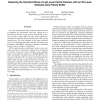Free Online Productivity Tools
i2Speak
i2Symbol
i2OCR
iTex2Img
iWeb2Print
iWeb2Shot
i2Type
iPdf2Split
iPdf2Merge
i2Bopomofo
i2Arabic
i2Style
i2Image
i2PDF
iLatex2Rtf
Sci2ools
100
click to vote
MICRO
2008
IEEE
2008
IEEE
Reducing the harmful effects of last-level cache polluters with an OS-level, software-only pollute buffer
It is well recognized that LRU cache-line replacement can be ineffective for applications with large working sets or non-localized memory access patterns. Specifically, in lastlevel processor caches, LRU can cause cache pollution by inserting non-reuseable elements into the cache while evicting reusable ones. The work presented in this paper addresses last-level cache pollution through a dynamic operating system mechanism, called ROCS, requiring no change to underlying hardware and no change to applications. ROCS employs hardware performance counters on a commodity processor to characterize application cache behavior at run-time. Using this online profiling, cache unfriendly pages are dynamically mapped to a pollute buffer in the cache, eliminating competition between reusable and nonreusable cache lines. The operating system implements the pollute buffer through a page-coloring based technique, by dedicating a small slice of the last-level cache to store nonreusable pages. Measurem...
Cache | Cache Pollution | Hardware | Last-level Cache | MICRO 2008 |
| Added | 31 May 2010 |
| Updated | 31 May 2010 |
| Type | Conference |
| Year | 2008 |
| Where | MICRO |
| Authors | Livio Soares, David K. Tam, Michael Stumm |
Comments (0)

